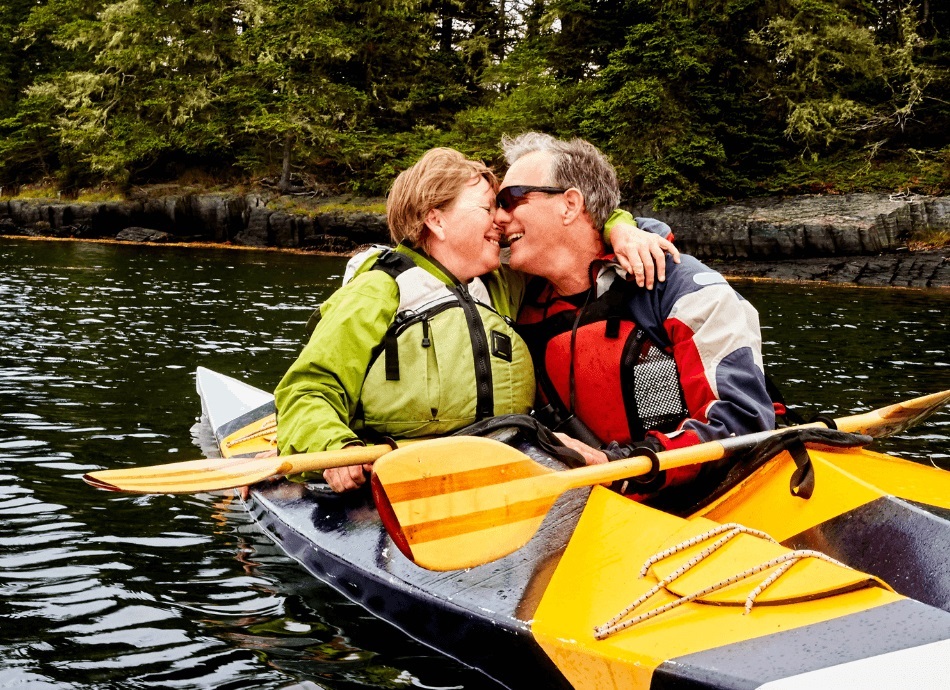You can now add Healthify as a preferred source on Google. Click here to see us when you search Google.
Sex and ageing
Key points about sex and ageing
- The need for affection and intimacy doesn't stop just because you are getting older.
- While the ways of being intimate with your partner might change over time, intimacy and closeness continue to be important needs.
- Ageing and sexuality looks different for everyone.
-
Clear communication with your partner is key to connecting and working out what you both want – no matter how old you are.

Keep fit and healthy
Getting regular exercise and eating a healthy diet is good for your overall health. But it also helps you with your sex life by giving you energy and stamina. It may also help prevent any sprains or strains.
Include pelvic floor exercises
Strengthening your pelvic floor muscles with regular pelvic floor exercises can improve your ability to have sex. A strong pelvic floor –the layer of muscle that stretches from your pubic bone in the front to your tail bone at the back – also improves bladder and bowel control. This applies to both women and men.
Have realistic expectations
Remember you’re not young anymore and the sex life you once had is not the one you’re likely to have as you get older. It doesn’t mean it won’t be as good, it might just be different.
Take your time
Take things slowly. As you age, your sexual responses may take longer, which can open the door to new types of experiences. Set aside more time for foreplay – intimacy is much more than just the act of intercourse itself.
Make it romantic
Foreplay doesn’t have to be physical. It can be something that enhances your emotional connection, such as a romantic dinner or listening to music you both enjoy.

Image credit: Canva
Educate yourself
Take some time to read and research articles about sex in later life. There’s a whole lot of information and self-help books that you and your partner could read – either separately or together. There are links to websites and articles in the more information section below.
Use lubrication
For women, vaginal dryness is a common problem as age sets in due to changing hormonal levels. Lubricating gels and liquids can help. However, if that doesn’t work, talk to your nurse or GP for advice. There are hormonal-based prescription creams and pessaries that can make the world of difference.
Impotence/erectile dysfunction
For men, erectile dysfunction (inability to maintain an erect penis) can be more common in later years. There are medications that can help. If it’s an ongoing problem, talk to your nurse or GP for advice.
Maintain physical affection
There are many ways to connect sexually. It’s not just about intercourse. Certain physical limitations in older age may mean you need to think differently about how to give each other physical pleasure.
Experiment
With many years of experience under your belt, you may have an increase in confidence in the bedroom. This may allow you to relax more, have more fun and try new things – as long as you both want to!
If you have any concerns relating to your sexual functioning, physical or emotional, please talk to your healthcare provider.
Don’t treat sex as a taboo subject
If you have a partner, talk openly with them about any changes you are experiencing or what might be different while being intimate. Get advice if you need it. Speak to your healthcare provider, find a menopause specialist or clinic for advice, research the issue and check out information available from organisations such as Age Concern(external link) and Sexual Wellbeing Aotearoa(external link).
Talk to a doctor or nurse
If you sense a change in your own desire, or that of your partner, don't assume they aren't interested in you any more. Sexual desire can be affected by medications, chronic illness, changes in your body including hormone depletion, and poor general or mental health. But lowered drive or desire does not have to be normal, or expected, so seek the advice of your healthcare provider if you have any questions. There is a lot of useful information on this page – sexual problems and talking to your doctor.
It might also be helpful to talk to a therapist, either alone or together. Find someone who has training in helping people with sexual problems.
Ageing as an LGBTQIA+ person
Lesbian, Gay, Bisexual, Transgender, Takatāpui, Queer, Intersex and Asexual people might find it harder to reach out or access the resources they need as they age. In Aotearoa New Zealand it is illegal to discriminate against anyone, including because of their sexual orientation or gender identity. This means that healthcare and services for older people must be accessible, fair and non-judgmental for LGBTQIA+ people.
Practice safe sex
Remember you can catch a sexually transmitted infection at any age, so you should still be sensible about sexual activity and take precautions. This is especially important if you are dating or not in a long-term relationship. Talk with your healthcare provider about ways to protect yourself from STDs and infections during your regular check-ups and if you have any concerns between visits.
Know your rights
If you live in a rest home or in a healthcare facility, there should be a policy about your rights to privacy and to share a bedroom with your partner. If you are considering aged care or moving into a retirement community, make sure you inquire fully about the support they can offer you.
With the right communication and support in place, you can expect an active and enjoyable sex life as you age.
Intimacy and sexuality(external link) Age Concern NZ
Silver Rainbow(external link) (video) is an educational workshop for care workers and managers in the aged care sector. The aim is to have rainbow friendly aged care services throughout New Zealand
Kahui tu kaha Rainbow Services(external link)
Sexuality and intimacy in older adults(external link) National Institute on Aging, US
Sexual health and aging – keep the passion alive(external link) Mayo Clinic, US
How our sexuality changes as we age(external link) Psychology Today, 2023
References
- Intimacy and Sexuality(external link) Age Concern NZ(external link)
- Older people still have sex, but it’s the intimacy and affection that matters more(external link) The Conversation, NZ, 2017
-
Sexuality in later life(external link) National Institute of Health, UK
Stowell M, Hall A, Warwick S,et al. Promoting sexual health in older adults – findings from two rapid reviews(external link) Maturitas 2023 Nov;177:107795
Supporting intimacy and sexuality in older people(external link) Ausmed, NZ
Course
Older LGBTQIA+ adults and sexual health(external link) National LGBTQIA+ Health Education Center, US Recorded webinar and evaluation
Credits: Healthify editorial team. Healthify is brought to you by Health Navigator Charitable Trust.
Page last updated:





